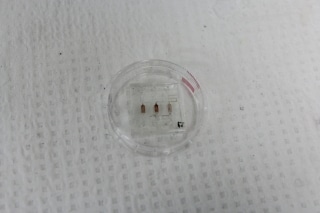Jul 31 2018
McGill University researchers have created a new type of “lab on a chip” that has the potential to become a clinical tool capable of detecting minute quantities of disease-causing bacteria within a few minutes.
 This new type of “lab on a chip” developed by McGill University scientists has the potential to become a clinical tool capable of detecting very small quantities of disease-causing bacteria in just minutes. (Image credit: McGill University)
This new type of “lab on a chip” developed by McGill University scientists has the potential to become a clinical tool capable of detecting very small quantities of disease-causing bacteria in just minutes. (Image credit: McGill University)
The device built by Sara Mahshid, Assistant Professor in the Department of Bioengineering at McGill, is composed of nano-sized “islands,” about one-tenth of the thickness of a single human hair, which serve as bacterial snares or traps.
In partnership with colleagues from the University of Toronto, Professor Mahshid’s team was able to show that the system is capable of examining very tiny volumes of culture media containing bacteria such as E. coli and a strain of S. aureus resistant to methicillin, an antibiotic meant for treating bacterial infections.
Bacterial infections are responsible for 700,000 deaths annually, and effective treatment of many disease-causing infections depends mainly on fast detection. Regrettably, it occasionally takes several days to verify a diagnosis with the tools presently available to doctors.
Speed is of the essence because some bacterial infections can cause serious health problems and sometimes lead to death. With a fluorescent microscope, the device we’ve developed can confirm the presence of bacteria in just a few minutes. I hope one day clinicians will use our device to deliver faster diagnostics, start treatment much more quickly and, ultimately, save lives.
Sara Mahshid, Assistant Professor
Mahshid and her team, who recently published their research in the journal Small, now hope to try out their device on clinical samples, a required step before doctors are able to employ such a device in a hospital site. Theoretically, this new lab-on-a-chip, which is comparatively economical and easy to make, could also examine samples from blood, urine, or nasal swabs.
This study was sponsored by the Faculty of Engineering at McGill University and the Natural Sciences and Engineering Research Council of Canada.